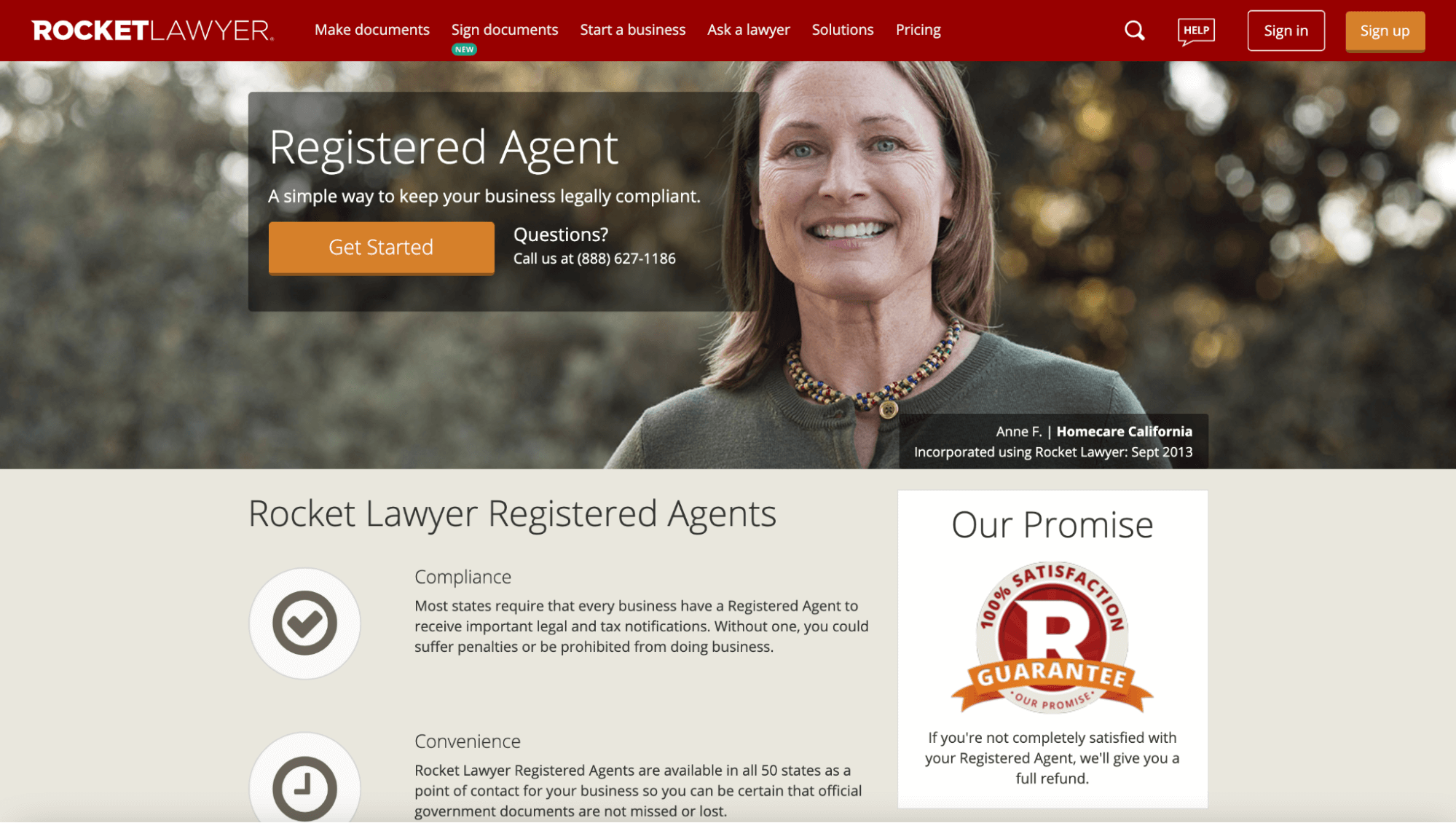Disclosure: This content is reader-supported, which means if you click on some of our links that we may earn a commission.
Creating a limited liability company (LLC) in Arizona offers tax advantages, personal liability protection, and it doesn’t even cost much to set up. Many new and aspiring business owners are intimidated by the prospect of setting up a formal business entity, but the benefits are usually well worth it. In this guide to starting an LLC in Arizona, we’ll walk you through all the necessary steps.
Why Starting an LLC in Arizona is Worth It
Setting up an LLC in Arizona is generally more straightforward than forming a corporation and offers more protection for your personal assets than a sole proprietorship or partnership.
The limited liability company (LLC) business structure confers two important benefits. For one, it allows what’s known as “pass-through” taxation. This means that profits generated by the LLC are not taxed until they “pass through” to its members as income. On the other hand, profits generated by corporations are taxed, as is income derived by members—a system known as double taxation because the profits are essentially taxed twice.
The LLC structure also offers important liability protection by keeping your personal and business assets separated. This means that if your business is the subject of a lawsuit, defaults on debts, or goes bankrupt, that your personal assets cannot be seized to pay damages. However, if you’re a sole proprietor or partnership, your assets could be at risk, including your home and savings.
Registering an LLC in Arizona comes with an additional benefit. Unlike most states, you’re not required to file annual reports or pay a yearly fee in Arizona to maintain your LLC. This means less paperwork to worry about and one less ongoing expense.
The Investment Needed to Start an LLC in Arizona
Setting up an LLC in Arizona is not particularly complicated or expensive, but it is a multi-step process needing very specific forms. Mistakes and failures to comply with all the requirements can result in having to start the process over again, meaning lost time and lost filing fees.
One thing to note: in addition to regular LLCs, Arizona also has a “Professional” LLC designation. A professional LLC (PLLC) is formed by a person or people who wish to provide a service that requires them to be licensed or otherwise authorized by an Arizona licensing authority. Certified public accountants, dentists, veterinarians, lawyers, and architects are some, but not all, of Arizona’s licensed professions.
Using an LLC formation service can save time and ensure that you’ve done everything right. LegalZoom has helped form more than two million businesses. In addition to registering your business name and filing your articles of organization for you, LegalZoom can also provide registered agent services, operating agreements, EINs, business licenses, permits, and more.

LegalZoom pricing starts at $79 plus state filing fees with an estimated processing time of 30 days. The more premium packages, Standard ($329 plus state fees) and Express Gold ($349 plus state fees), include additional help and expedited processing. Standard is 15 days, and Express Gold takes it down to 7-10 days with express shipping.
9 Steps to Starting an LLC in Arizona
Starting an LLC in Arizona isn’t difficult, but there are multiple steps in the process. Here, we walk you through them so you can understand the process and get started today.
#1 – Check and secure your business name
Carefully consider the name you’d like to use for your LLC, but try not to get too attached to any one name, in case it’s already in use. Your first step should be to do a general Google search of the name to see if it’s in use by another company. If it is, consider finding a different name to avoid legal complications later.
However, don’t assume that it’s fair game just because your name doesn’t show up in a Google search. Your name may be legally registered by another company but not widely known. Your next step should be to check your preferred name on the Arizona Corporation Commission (ACC) to see if other corporations, trade names, or LLCs are already using it.
If the name you want is available on the ACC website, you have three options:
- You can reserve the name through the ACC. This reservation is good for 120 days. In most cases, this should be plenty of time to organize and submit your LLC paperwork. The cost is $10 by mail or $45 online.
- You can go to the Secretary of State’s website and register the name as a trade name. This is sometimes called a “doing business as” or “fictitious name” and is the name under which your company will be doing business (this may or may not be the same as the name you use to register your LLC). Registration is good for five years and costs $10.
- If you’re ready, you can go ahead and submit your LLC formation documents online, by fax, or by email. You can find more details here.
This is also an excellent time to check for available domain names and buy the appropriate one for your company.
#2 – Appoint a statutory agent
A statutory agent is a person or legal entity responsible for receiving legal documents and official notices from the Arizona Corporate Commission on behalf of your LLC. In other states, a statutory agent is sometimes known as a registered agent. If a person, your agent must be a legal resident of Arizona. If a company, it must be registered to do business in the state of Arizona. In both cases, statutory agents must have a physical street address located in Arizona.
You or anyone else in your company can be your agent. However, think carefully before choosing an individual over an entity. Agents’ names and physical addresses will be public knowledge, and agents are expected to be available to receive communication at their registered address during all regular working hours.
Having a professional service act as your agent usually costs a small annual fee and may be worth it for the security of knowing that it’s being done right.
If you use a business formation service like LegalZoom, they also offer statutory/registered agent services.

#3 – File your articles of organization
The cost for the articles of organization is only $50, and you can do it online. The process can take up to 30 days from the time of filing to acceptance. If you’re in a hurry, you can pay between $35 and $400 extra for expedited processing.
Form L010 – Articles of Organization: This single document includes the following information:
- Your LLC name
- Your business address
- The name and address of your statutory agent
- The names and addresses of the LLC’s members or managers
- A description of services if you’re a PLCC
- If the LLC is member-managed or manager-managed
The LLC’s organizer has to sign it. This can be a member or manager.
Statutory Agent Acceptance: This document must be signed by the person or entity acting as your agent formally accepting that responsibility.
Member or Manager Structure Attachment: These are lists of all your LLC’s members or, in the case of the Manager Structure Attachment, managers and members who own more than 20% of the business’s profits.
Cover Sheet: This sheet is basic data such as contact information and the type of filing.
#4 – Complete publication requirements
Arizona requires all newly formed LLCs to publish a notice of filing of Articles of Organization in a newspaper in general circulation in the county where your business is registered (this rule does not apply to businesses registered in Maricopa or Pima counties). The notice must appear in three consecutive publications within 60 days of the date on which the Corporations Commission approves the filing of your LLC’s Articles of Organization. Failing to meet this requirement could result in your LLC being dissolved.
Notices must include the following:
- Your LLC’s name
- The name and address of your statutory agent
- The address of the LLC’s principal place of business (if different from that of the statutory agent)
- Whether your LLC is member-managed or manager-managed
- The name(s) and address(es) of either your LLC manager or each member of your LLC
You may publish your Articles of Organization in their entirety if you prefer.
#5 – Prepare an Operating Agreement
Under Arizona law, you are not required to have an operating agreement for your LLC, but you should have one anyway. In the absence of an operating agreement, state law governs how your LLC will operate, so having an operating agreement gives you more control over your business.
An operating agreement sets out the rights and responsibilities of all members and managers and describes how the company will be run. And, like a separate bank account (see Step 8, below), it helps maintain your limited liability status by serving as evidence that your LLC is a truly separate entity.
In addition to responsibilities, operating agreements typically lay our profit sharing, voting rights, adding or removing a member, and dissolution processes. Having this information clearly laid out helps your business run smoothly and helps solve internal disputes.
#6 – Get an LLC EIN from the IRS
Arizona requires that any LLC with more than one member obtain an Employee Identification Number (EIN). Even if you are the sole member of your LLC, having an EIN enables you to set up a business bank account, an essential step in keeping your personal and business assets separate.
It costs nothing, can be done online here, and typically takes only a few minutes. If you are working with a business formation service, they may include an EIN for your business in their package.
#7 – Comply with tax and regulatory requirements
Arizona has some unique tax regulations that are important to understand. For one, it levies a transaction privilege tax (TPT) on the gross receipts of businesses in a number of industries. The exact amount depends on your commercial classification. All sales subject to TPT are also subject to applicable county excise taxes.
To find out exactly your tax responsibilities, check the Arizona Department of Revenue (AZDOR) and the Arizona Commerce Authority Small Business Services. It may also be worth consulting with a certified public accountant who’s familiar with Arizona tax law.
You will also need to register your business with the city or county in which your business is located. This is both for tax purposes and for any business or occupational licenses the city requires. The Commerce Authority Small Business Services has links to sites to learn more about your specific location and licensing requirements.
#8 – Set up a business bank account
To maintain your LLC status, it’s essential to keep your personal and business finances separate. If you mingle them, you may lose the liability protection the LLC designation confers. One easy way to support that separation is to create a business bank account and use it strictly for business-related activity. You should choose a bank or credit union that is based in or has branches in Arizona.
Try to use only your business funds to pay for business-related expenses. If you use personal money, keep a record and reimburse yourself. It may seem like an unnecessary effort if you’re the sole owner/member of your business, but it’s an integral part of maintaining your business structure. Getting a business credit card to pay for expenses can streamline this process.
#9 – Maintain your LLC
One of the benefits of having an Arizona LLC is that you do not have to file an annual report with the Arizona Corporation Commission or pay an annual fee to exist. You should still take steps to ensure it’s maintained, however.
As mentioned above, keeping your business completely separate from your personal accounts is one way to do this. Having an operating agreement is another.
Other ways include making regular payments to members in accordance with your operating agreement, not using your business account to pay for personal expenses, and keeping on top of your tax obligations at the city, county, state, and federal levels.
You should also keep the following records somewhere safe and accessible:
- LLC articles of organization
- LLC operating agreement
- A list of all the members of your LLC, as well as their addresses, contributions, and shares
- EIN confirmation letter
- Meeting minutes, financial transactions, and other records as required by the operating agreement
- All financial statements and tax records
- All business licenses and permits
Next Steps
Congratulations! You’ve created your Arizona LLC. If you’d like to go deeper on how to create an Operating Agreement for your business, read our 5 Easy Steps to Create an Operating Agreement. For more details on ensuring that your LLC is maintained correctly, check out our Complete Guide to Maintaining Your LLC.















